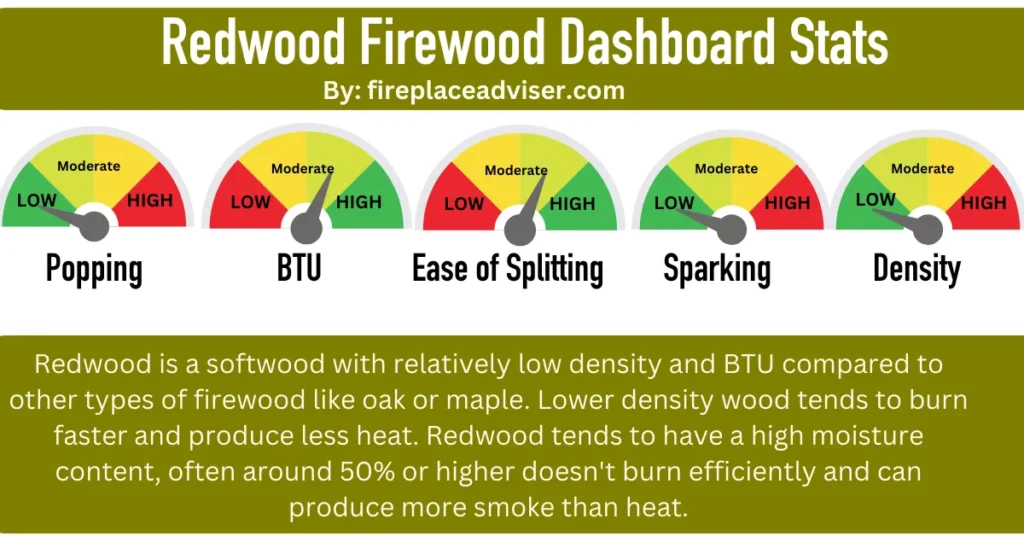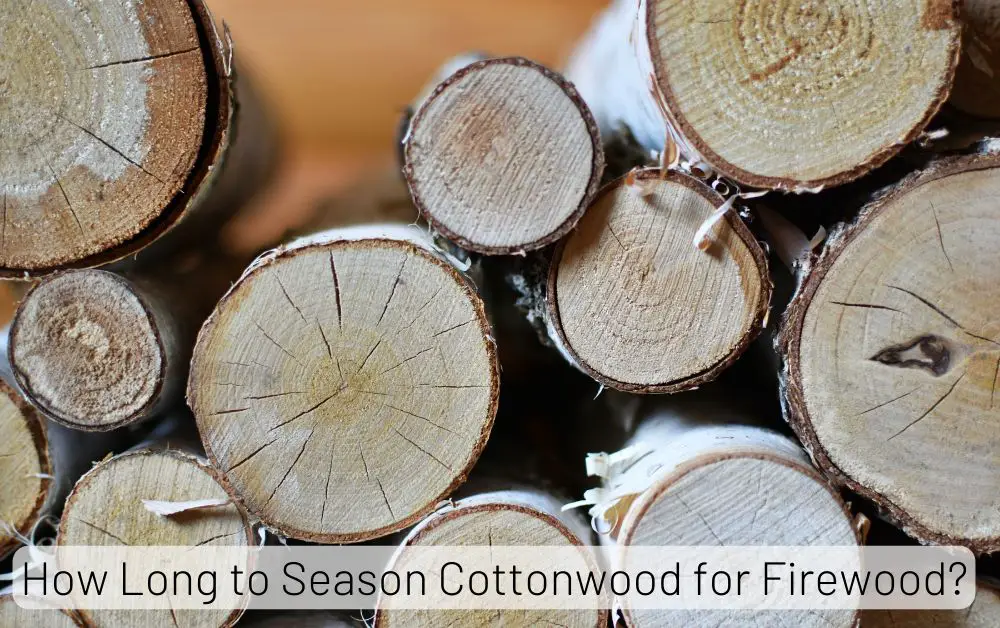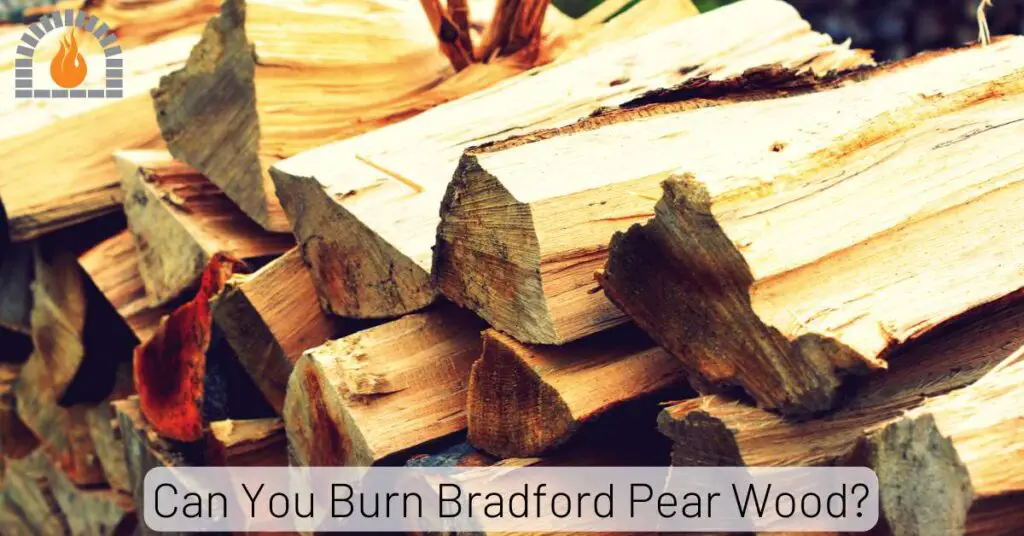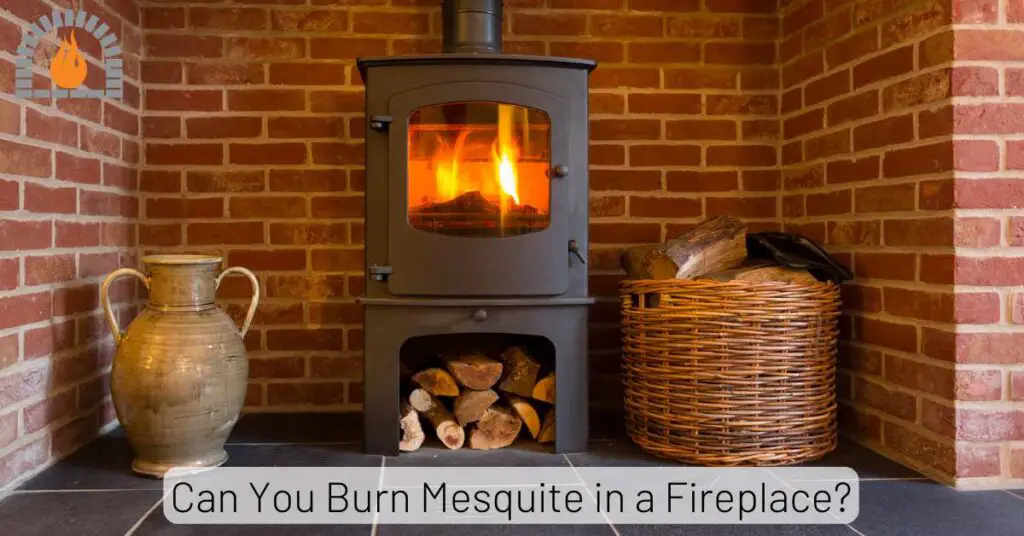Exploring the world of firewood options can be both intriguing and daunting. With various types available, it’s essential to understand their qualities and characteristics. Among these options is redwood, known for its impressive stature and durability. But is redwood good firewood?
Overview
| Redwood Firewood Attribute | Description |
|---|---|
| BTU | Moderate; 20.1Million BTU’s per Cord. |
| Nature of Smoking | Moderate; produces minimal smoke when seasoned properly. |
| Nature of Popping | Low; tends to pop less compared to some other types of wood. |
| Nature of Sparking | Low; tends to produce minimal sparks. |
| Ease of Seasoning | Moderate; requires adequate time to season properly, but once seasoned, it burns well and produces less smoke. |
| Ease of Splitting | Moderate to difficult; redwood can be dense and resistant to splitting, may require a powerful splitter or tools. |
| Moisture Content | Initially high; redwood has a higher moisture content compared to some other hardwoods, but it dries well over time. |
| Overall Quality | High; redwood firewood is prized for its high BTU, low smoke, and pleasant aroma when burned in a well-seasoned state. |
Is Redwood Good Firewood?
Redwood is a softwood with relatively low density and BTU compared to other types of firewood like oak or maple. Lower density wood tends to burn faster and produce less heat. Redwood tends to have a high moisture content, often around 50% or higher doesn’t burn efficiently and can produce more smoke than heat.
Redwood contains natural resins that can create excessive creosote buildup in chimneys and flues when burned, increasing the risk of chimney fires.
However, if redwood firewood is available at a reasonable price or free of charge, it can be worth using, especially for starting fires or shorter burning sessions.

Pros of Redwood Firewood
Redwood firewood offers several advantages:
-
Redwood is known for its dense wood, which burns efficiently and produces moderate heat. This makes it ideal for keeping your home warm during cold weather.
-
Due to its density, redwood burns slowly, providing a longer-lasting fire compared to softer woods. This means you spend less time adding logs to the fire and more time enjoying its warmth.
-
Redwood tends to produce minimal smoke and sparks compared to other firewood types. This can lead to a cleaner and safer burning experience, especially indoors.
-
Burning redwood emits a pleasant aroma, adding to the ambiance of your fire. This can enhance your overall experience, whether relaxing indoors or enjoying an outdoor gathering.
-
Depending on your location, redwood may be readily available, especially in regions with common redwood trees. This accessibility can make it a convenient choice for firewood.
-
Redwood logs often have a beautiful, reddish hue with unique grain patterns. They can create visually appealing flames as they burn, adding aesthetic value to your fireplace or campfire.
-
Redwood is naturally resistant to decay and insect damage due to its high tannin content. This means that even if you have leftover firewood exposed to the elements, it will degrade slower than some other types of wood.
Related Post: Is Sassafras Good Firewood?
Cons of Redwood Firewood
-
Redwood is a softwood with relatively low density compared to hardwoods. This means it doesn’t produce as much heat when burned and may not provide long-lasting fires, requiring more frequent refueling.
-
Redwood typically has a higher moisture content compared to hardwoods. Burning wet or green wood can lead to inefficient combustion, excess smoke, and creosote buildup in chimneys, which poses a fire hazard.
-
Due to its low density and high moisture content, redwood tends to burn relatively quickly. This can result in more frequent refueling than denser hardwoods, making it less convenient for sustained heating.
-
Redwood contains natural resins and oils that can create a lot of smoke when burned. This can lead to poor air quality and increased maintenance requirements for chimneys due to creosote buildup.
-
Redwood trees are primarily found in specific regions, such as the Pacific Northwest of the United States. In areas where redwood is less common, it may not be as readily available as firewood, making it less convenient and potentially more expensive.
FAQs
Does redwood produce a lot of smoke when burned?
Redwood is known for its clean and efficient burn, producing minimal smoke compared to other types of firewood. Its low moisture content contributes to cleaner combustion, resulting in less smoke and a more enjoyable burning experience.
Is redwood suitable for use in wood-burning stoves?
Redwood is an excellent choice for wood-burning stoves due to its high density and heat output. Its clean-burning properties make it ideal for indoor heating applications, providing reliable warmth with minimal residue.
How does redwood compare to other types of firewood?
Redwood stands out for its exceptional qualities, including high density, low moisture content, minimal residue, longevity, and aromatic properties. Compared to many other types of firewood, redwood offers superior performance and environmental benefits.
Can redwood be harvested sustainably?
Redwood forests are managed sustainably, ensuring that new growth continues to replenish the supply. Consumers can support sustainable forest practices and minimize environmental impact by selecting redwood from responsibly managed forests.
Does burning redwood release harmful chemicals into the air?
Redwood produces minimal emissions and harmful chemicals when burned properly, contributing to better air quality and a healthier indoor environment. Its clean-burning characteristics make it a safe, eco-friendly choice for heating and ambiance.
Is redwood suitable for outdoor fire pits and bonfires?
Yes, redwood is well-suited for outdoor fire pits and bonfires, thanks to its resilience and aromatic properties. Whether used for cooking, warmth, or recreation, redwood enhances the outdoor experience with its natural beauty and reliable performance.
Affiliate Disclosure: Fireplaceadviser.com is a participant in the Amazon Services LLC Associates Program. We may earn a commission when you click on certain links on this site and purchase.

Hello!! I am Jamal Khan. I often fix my home electric heaters and gas stove problems and research the common issues in the heating units to improve my knowledge and expertise. The aim of establishing fireplaceadviser.com is to share my expertise and knowledge with my audience.















